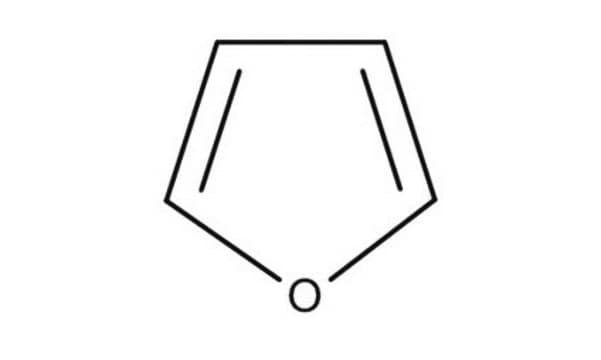43861
Furan
analytical standard
About This Item
Produits recommandés
Qualité
analytical standard
Niveau de qualité
Densité de vapeur
2.35 (vs air)
Pression de vapeur
1672 mmHg ( 55 °C)
31.66 psi ( 55 °C)
493 mmHg ( 20 °C)
9.22 psi ( 20 °C)
Pureté
≥98.0% (GC)
Durée de conservation
limited shelf life, expiry date on the label
Contient
~0.025% 2,6-di-tert-4-methylphenol as stabilizer
Limite d'explosivité
14.3 %
Technique(s)
HPLC: suitable
gas chromatography (GC): suitable
Indice de réfraction
n20/D 1.421 (lit.)
n20/D 1.421
Point d'ébullition
32 °C/758 mmHg (lit.)
Densité
0.936 g/mL at 25 °C (lit.)
Application(s)
cleaning products
cosmetics
environmental
food and beverages
personal care
Format
neat
Température de stockage
2-8°C
Chaîne SMILES
c1ccoc1
InChI
1S/C4H4O/c1-2-4-5-3-1/h1-4H
Clé InChI
YLQBMQCUIZJEEH-UHFFFAOYSA-N
Vous recherchez des produits similaires ? Visite Guide de comparaison des produits
Description générale
Application
Mention d'avertissement
Danger
Mentions de danger
Conseils de prudence
Classification des risques
Acute Tox. 4 Inhalation - Acute Tox. 4 Oral - Aquatic Chronic 3 - Carc. 1B - Flam. Liq. 1 - Muta. 2 - Skin Irrit. 2 - STOT RE 2
Risques supp
Code de la classe de stockage
3 - Flammable liquids
Classe de danger pour l'eau (WGK)
WGK 3
Point d'éclair (°F)
-32.8 °F - closed cup
Point d'éclair (°C)
-36 °C - closed cup
Faites votre choix parmi les versions les plus récentes :
Déjà en possession de ce produit ?
Retrouvez la documentation relative aux produits que vous avez récemment achetés dans la Bibliothèque de documents.
Les clients ont également consulté
Notre équipe de scientifiques dispose d'une expérience dans tous les secteurs de la recherche, notamment en sciences de la vie, science des matériaux, synthèse chimique, chromatographie, analyse et dans de nombreux autres domaines..
Contacter notre Service technique















